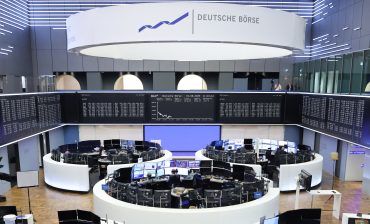
- Earnings Season
- European Stocks
- Global Trade
European Stock Markets Rise as Quarterly Earnings Drive Gains
6 minute read

European equity markets gain momentum as industrial and healthcare companies report strong quarterly performance across major indices
Key Takeaways
- European stocks gain across major indices as Germany’s DAX climbs 0.5%, France’s CAC 40 rises 0.1%, and the U.K.’s FTSE 100 increases 0.3% amid a positive earnings season
- Novo Nordisk cuts full-year guidance despite strong performance, citing slower-than-expected growth in weight-loss drugs Wegovy and Ozempic
- Oil prices rebound 0.8-0.9% as Brent reaches $68.28 per barrel following API data showing a 4.2 million barrel inventory draw, well above the expected 1.8 million
Introduction
European markets demonstrate resilience as investors digest a stream of quarterly earnings results that reveal both opportunities and emerging challenges. According to Investing.com, major European indices post gains amid generally positive corporate results, though companies begin signaling potential third-quarter headwinds from tariff impacts.
The earnings season presents a mixed picture of corporate health. While many companies report strong fundamentals, guidance adjustments and restructuring announcements suggest businesses prepare for a more challenging operating environment ahead.
Key Developments
Pharmaceutical giant Novo Nordisk delivers the session’s most significant earnings surprise, reducing full-year sales and profit guidance despite reporting double-digit gains in the first half. The Danish company cites slower adoption rates for its blockbuster weight-loss treatments as the primary factor behind the revised outlook.
Industrial conglomerate Siemens Energy provides a contrasting narrative, projecting it will reach the upper end of its 2025 growth targets. Strong demand for wind turbines and power equipment in the U.S. market helps offset tariff-related pressures, demonstrating the company’s geographic diversification strategy.
Healthcare company Fresenius raises its revenue outlook, expecting organic growth of up to 7%. The German firm’s optimistic projection stands out amid a cautious earnings environment, reflecting strength in its core healthcare services business.
Bayer continues its significant restructuring effort, cutting approximately 12,000 positions as part of efficiency improvements. The German pharmaceutical and agriculture company faces ongoing challenges from litigation costs and competitive pressures in key markets.
Market Impact
European equity markets respond positively to the earnings flow, with Germany leading gains at 0.5%. The DAX’s outperformance reflects strong results from industrial companies like Siemens Energy, which benefit from infrastructure spending trends.
Commodity markets show renewed strength as oil prices recover from five-week lows. Brent crude gains 0.9% to $68.28 per barrel, while West Texas Intermediate rises 0.8% to $65.69. The rebound follows American Petroleum Institute data showing a significant 4.2 million barrel inventory draw, substantially exceeding analyst expectations.
Currency markets remain stable as investors focus on corporate fundamentals rather than broader economic indicators. German industrial orders disappoint with a 1% decline in June, contrary to expectations for a 1% increase, though the impact on equity markets remains muted.
Strategic Insights
The earnings results highlight a critical inflection point for European businesses navigating tariff uncertainties and shifting global trade patterns. Companies with diversified geographic exposure, such as Siemens Energy, demonstrate resilience through their ability to capitalize on regional growth opportunities.
The pharmaceutical sector faces mixed dynamics as Novo Nordisk’s guidance reduction contrasts with broader industry strength. The company’s weight-loss drug portfolio, while maintaining strong growth rates, encounters market adoption challenges that impact scaling expectations.
Financial services companies like Commerzbank show improvement in forward-looking metrics despite near-term profit pressures from restructuring costs. The German bank’s enhanced full-year outlook, despite a 14% decline in second-quarter net profit, signals management confidence in operational improvements.
Expert Opinions and Data
Technology sector analysis reveals significant transformation pressures across European markets. AMD’s recent results demonstrate the capital-intensive nature of competing in artificial intelligence and data center segments, with the company reporting record revenue of $7.7 billion alongside margin compression from increased research and development spending.
McKinsey research indicates substantial value creation potential, estimating that five key technology battlegrounds in Europe could generate nearly $800 billion in incremental value by 2030. Annual regional technology spending projects growth from $1.9 trillion to $2.7 trillion during this period.
Industry executives express measured optimism tempered by regulatory concerns. Survey data shows that while just over half of top European technology executives maintain positive growth outlooks, 60% identify regulatory barriers as significant obstacles to expansion plans.
Clean technology investment patterns show selective rather than broad-based retrenchment, with venture and growth funding declining to €1.8 billion in the first quarter. This represents an 18% quarter-over-quarter decrease, though targeted investments in energy storage and electric vehicle infrastructure continue.
Conclusion
European markets navigate a complex earnings landscape where strong operational performance coexists with cautious forward guidance. Companies demonstrate strategic adaptability through geographic diversification and operational restructuring, positioning for potential trade-related challenges.
The combination of positive equity performance, recovering commodity prices, and mixed economic indicators creates a nuanced investment environment. Corporate earnings continue driving market sentiment as businesses balance growth investments with margin protection in an evolving global trade framework.








